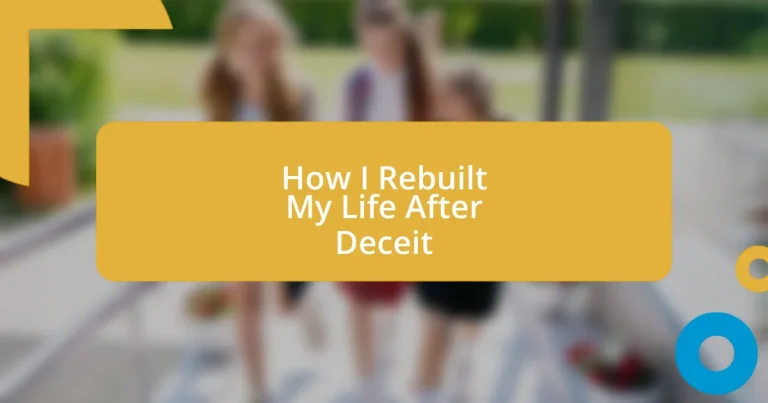Key takeaways:
- Deceit impacts not just relationships but also self-identity; acknowledging emotions and reframing experiences is crucial for recovery.
- Establishing a structured healing plan, including routine, professional support, journaling, and mindfulness, empowers personal growth and self-respect.
- Celebrating small victories fosters a positive mindset and reinforces resilience, reminding us that every step forward is significant in the healing journey.
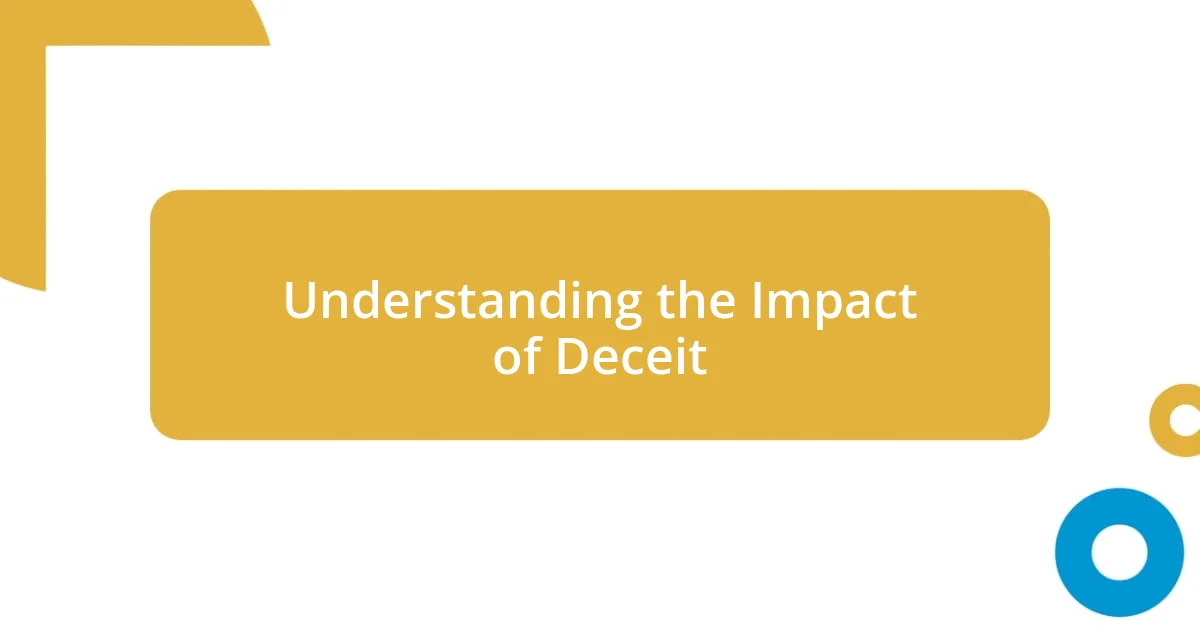
Understanding the Impact of Deceit
Deceit can shatter trust, leaving deep emotional scars. I remember the moment I realized I had been misled; it felt like stepping on a crack in the pavement and twisting my ankle—sudden, painful, and disorienting. It made me question not just that relationship but my ability to judge character, prompting me to wonder: How can we rebuild ourselves when the foundation we stood on crumbles beneath us?
The aftermath of deceit often lingers like a shadow, affecting not just our perception of others but also how we view ourselves. I often found myself grappling with self-doubt, replaying the events in my mind, dissecting every word and action. Have you ever felt a similar weight, as if the lies spoken not only altered your reality but also reshaped your identity?
Recovery from such betrayal requires acknowledging the impact it has on our well-being. I remember confiding in a close friend who encouraged me to reframe my experiences. Instead of defining myself by that deceit, she asked, “What strength can you find in this moment?” That question sparked a shift in me, highlighting how I could emerge more resilient, rather than remaining a victim of circumstance.
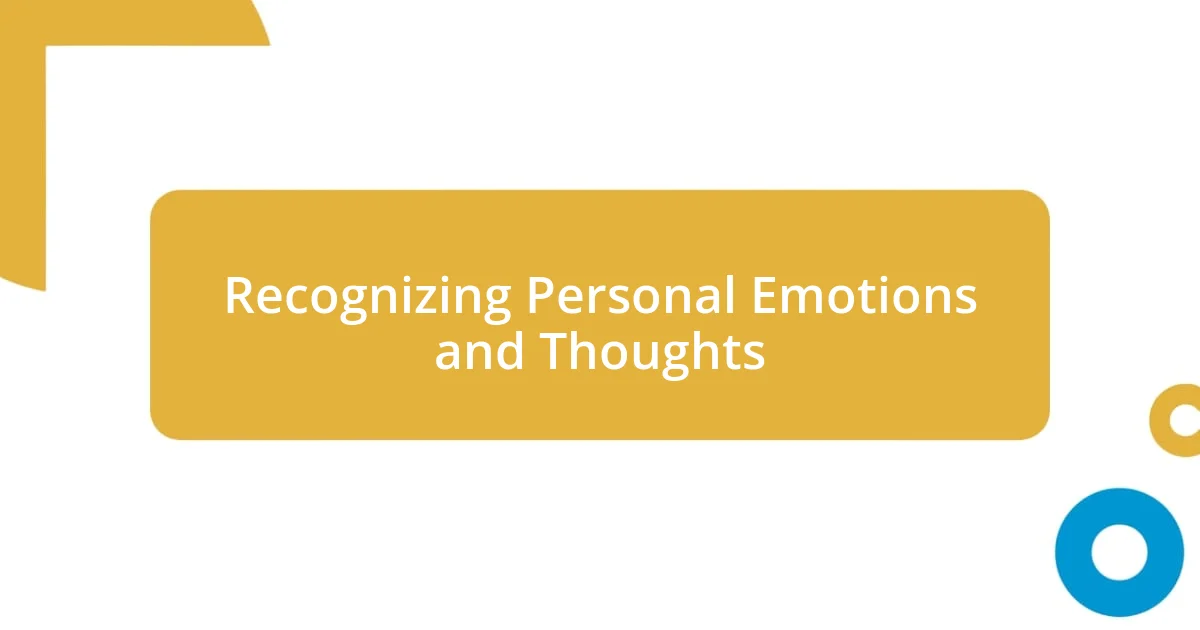
Recognizing Personal Emotions and Thoughts
Recognizing my emotions after betrayal was like attempting to navigate through fog—everything felt distorted and unclear. I would often wake up feeling a weight in my chest, a mix of anger and sadness. By simply acknowledging these feelings, I began to unravel their roots; was it anger towards the deceiver, or was it really frustration with myself for not seeing the signs?
Sometimes, I caught myself spiraling into negative thoughts, convincing myself I was unworthy of honest relationships. By journaling my thoughts, I learned to differentiate between fleeting emotions and profound beliefs about myself. It was a revealing experience, like holding a magnifying glass to my mind—it enabled me to confront those false narratives directly.
As I continued to explore my emotions, I recognized the need for self-compassion. Instead of criticizing myself for feeling lost, I started to tell myself, “It’s okay to feel this way; healing takes time.” Embracing these feelings helped me reclaim my narrative, transforming pain into a powerful catalyst for personal growth.
| Emotion | Recognizing Thoughts |
|---|---|
| Anger | Feeling betrayed and wanting to confront the deceiver |
| Sadness | Reflecting on what I lost and longing for trust |
| Self-Doubt | Questioning my judgment and fearing future relationships |
| Frustration | Being upset that I didn’t recognize the lies sooner |
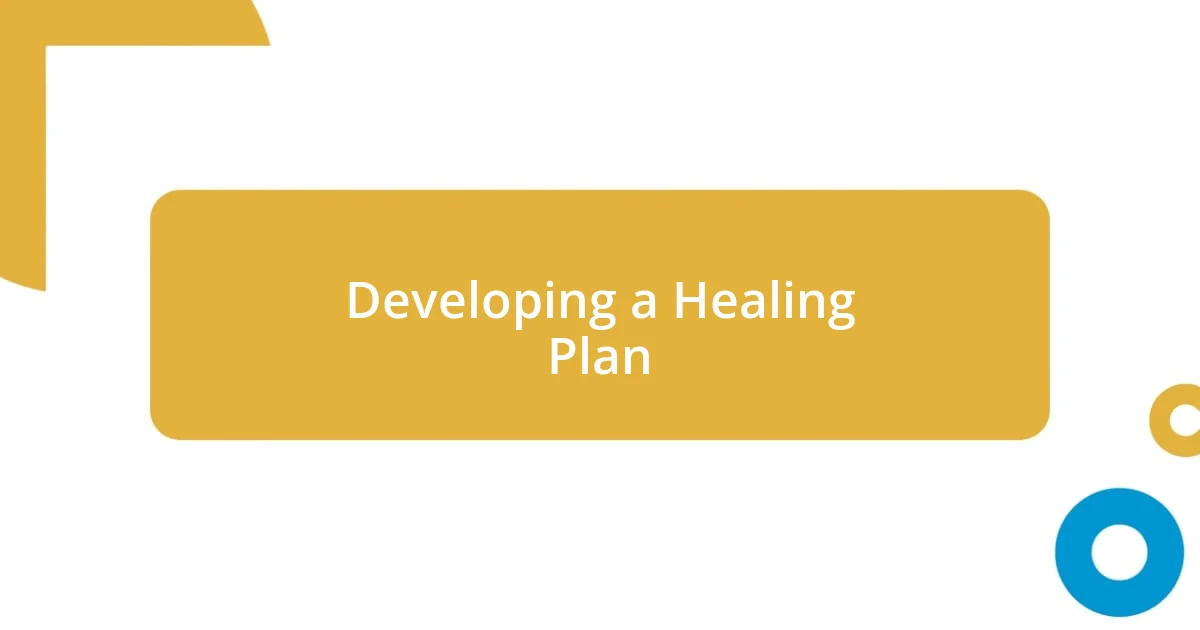
Developing a Healing Plan
Developing a healing plan is essential for turning the pain of deceit into a pathway for growth. I found it helpful to create a structured approach that included reflecting on my feelings and charting my journey. It’s like drawing a road map—I visualized where I wanted to go, even if the exact route was still unclear. Crafting this plan gave me a sense of control amidst the chaos.
Here are some key elements I incorporated into my healing strategy:
- Establishing Routine: Setting daily intentions helped me regain a sense of normalcy. I committed to simple practices, like taking a morning walk to clear my mind.
- Seeking Professional Support: I found talking to a therapist incredibly beneficial; they provided guidance that helped me navigate my emotions more effectively.
- Journaling: Writing became a cathartic outlet, allowing me to articulate my thoughts and confront my feelings without judgment.
- Establishing Boundaries: Learning to set limits with others was crucial. I recognized that I needed to protect my healing space, distancing myself from anyone who perpetuated negativity.
- Practicing Mindfulness and Meditation: This gave me the tools to ground myself, especially during moments of overwhelming anxiety.
In essence, each element I focused on wasn’t just a task—it became part of a journey towards reclaiming my narrative after betrayal. I remember vividly the first time I established my boundaries; it felt like reclaiming my personal power. The hesitation I felt melted away, replaced by an invigorating sense of self-respect.
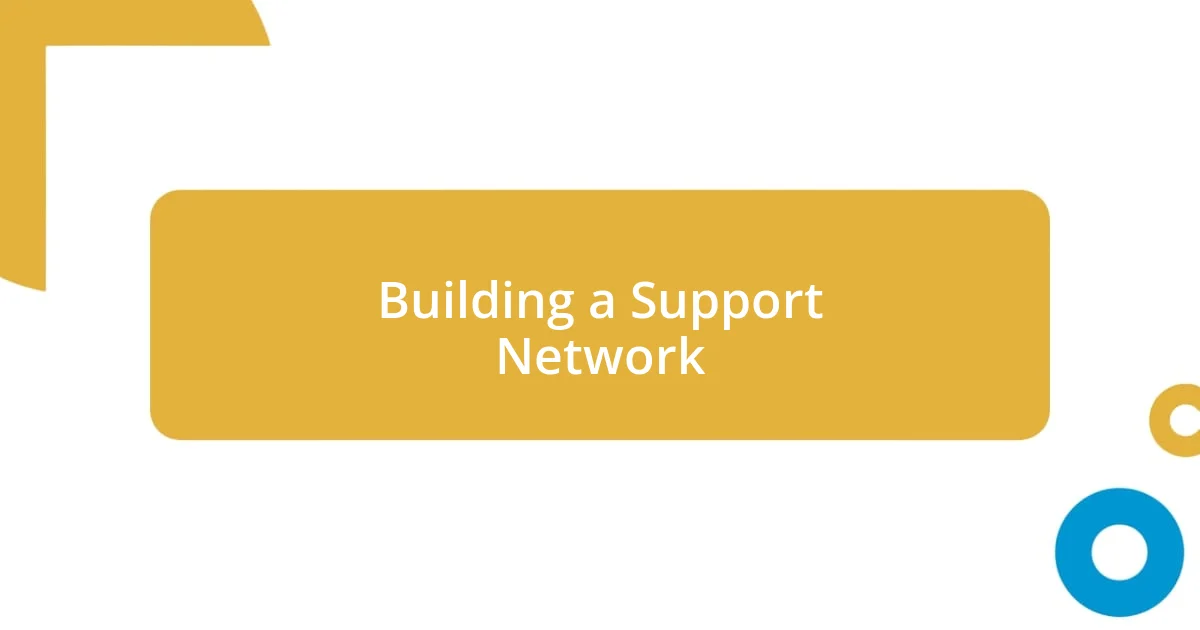
Building a Support Network
Building a support network was one of the most transformative steps I took during this journey. I realized that surrounding myself with positive, understanding people could significantly improve my emotional landscape. At first, it felt daunting to reach out after feeling so isolated, but I reminded myself how crucial connection is to healing. I started with small steps, like grabbing coffee with an old friend—I was amazed at how their genuine concern lifted my spirits.
When I began opening up about my experiences, I discovered that many people had faced similar challenges. It created an unexpected sense of camaraderie, as we shared vulnerability and strength. I recall specifically one conversation where a friend opened up about their own experience with betrayal, and it felt like we were both shedding the weight of our pasts together. That moment made me question: How often do we hesitate to share our stories, missing the chance to connect deeply with others?
Over time, I intentionally sought out groups that resonated with my healing goals, whether through workshops or online communities. Being part of a supportive environment not only reinforced my sense of belonging but also reminded me that I wasn’t alone in this journey. I remember the first time I participated in a group discussion; sharing my story felt like I was letting go of a burden I had been carrying alone for too long. Having a network of empathetic listeners created a safe space where I could grow and heal together with others.
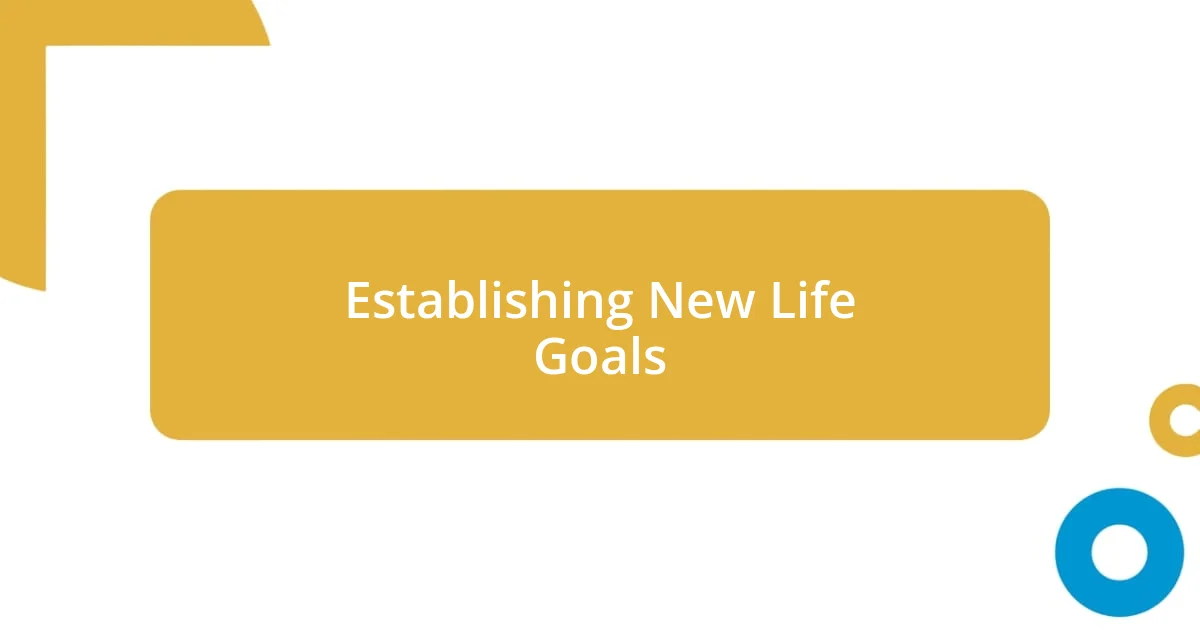
Establishing New Life Goals
Establishing new life goals felt both liberating and daunting at first. I remember sitting in my favorite café, sipping my coffee and pondering what I truly wanted after the upheaval. It was a stark contrast to my previous life—each new goal became a tiny beacon of hope. What would my priorities look like now? I found that focusing on personal growth brought an invigorating sense of purpose.
One of the most significant goals I set was to cultivate resilience. I made it a point to engage in activities that pushed my limits, whether it was taking up a new hobby or signing up for a class outside my comfort zone. For example, I joined a public speaking group, even though the thought of standing in front of people terrified me. Each time I faced that fear, I could feel the layers of insecurity peeling away, leading to a newfound confidence. Isn’t it fascinating how confronting vulnerabilities can lead to personal empowerment?
In addition to personal growth, I also re-evaluated my professional aspirations. I took a hard look at what I valued in my career, realizing I wanted to align my work with my passions. I began setting tangible goals, like pursuing projects that sparked my creativity. That shift in focus allowed me to embrace opportunities that once seemed out of reach, reinforcing my belief that I could create a life that resonated with my true self. Each small step toward these goals felt like I was reclaiming my life, inch by inch, brick by brick.
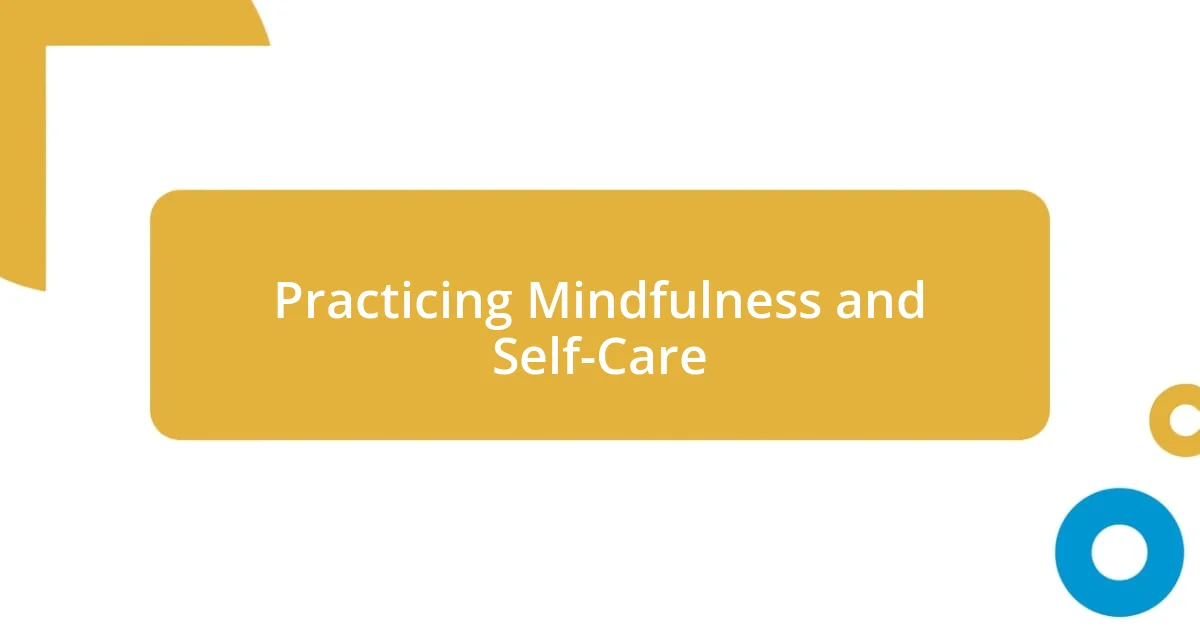
Practicing Mindfulness and Self-Care
Practicing mindfulness and self-care became my refuge during the rebuilding process. I remember spending quiet mornings meditating by my window, watching the world wake up outside. Those still moments allowed me to reconnect with myself, providing clarity when everything felt chaotic. I’ve often thought about how we underestimate the power of a few minutes of stillness; it’s like finding an anchor in a stormy sea.
Incorporating self-care routines brought a richness to my daily life that I didn’t know I was missing. Whether it was journaling my thoughts or taking long walks in nature, each activity became a form of therapy. One particular evening, I found solace in creating a simple self-care ritual; I filled a warm bath with lavender oil, letting the calming scent engulf me. What surprised me was how quickly those rituals transformed my mood, reminding me that small acts of kindness toward myself could yield profound peace.
I’ve learned that mindfulness isn’t just about meditation; it’s about being present in every moment. I started paying attention to simple pleasures, like the taste of my morning coffee or the sound of laughter from friends. During a particular challenging time, I made it a habit to pause and appreciate fleeting moments—like the feeling of sunlight on my face. It’s fascinating how this shift in perspective can deepen our appreciation for life, don’t you think? Embracing mindfulness allowed me to weave a thread of gratitude through my daily existence, ultimately helping me heal from wounds that once felt insurmountable.
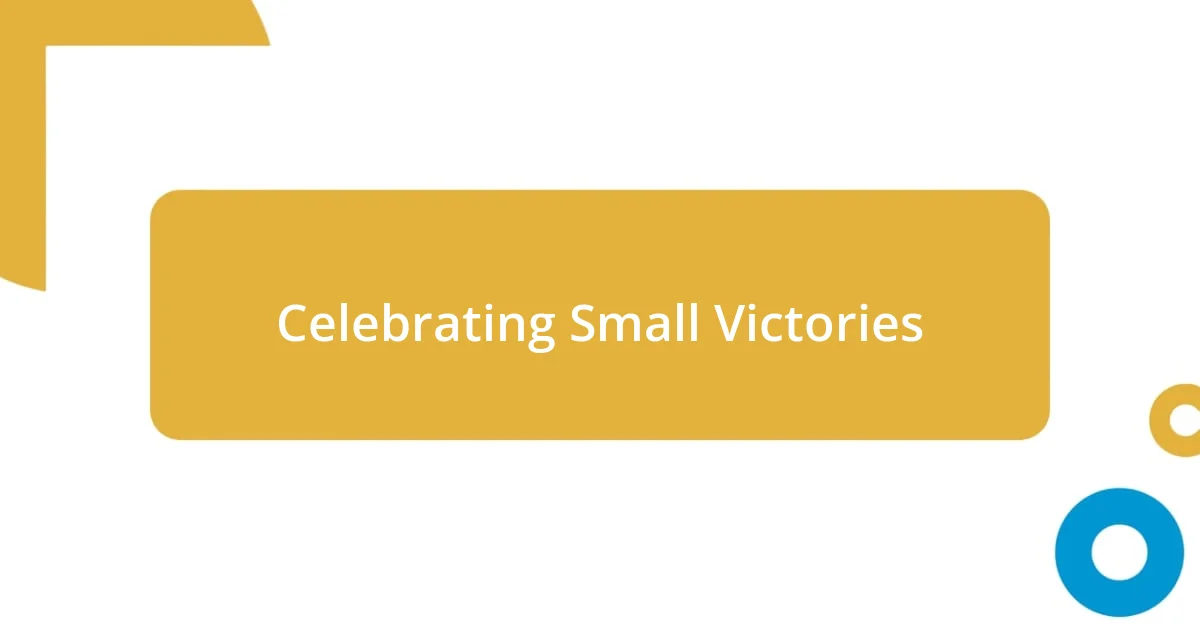
Celebrating Small Victories
Celebrating small victories was a turning point for me; it transformed the way I viewed progress in my life. I recall one evening after a long week of uncertainty, I managed to bake a cake from scratch. It wasn’t just about the cake itself; it was about the sense of accomplishment and joy that flooded my heart seeing it rise in the oven. That simple act became a reminder that even the smallest successes merit recognition.
I began to cultivate the habit of jotting down daily achievements, no matter how minor they seemed. I remember being thrilled the day I finished reading my first book after the whirlwind of deceit had thrown my focus off-kilter. It felt monumental! Each entry in my journal became a testament to my resilience and progress. I started asking myself: Why do we often overlook these little wins? It’s as if we’ve been conditioned to wait for grand achievements to validate our efforts, while in reality, those small wins are the building blocks of our new lives.
Over time, I noticed that celebrating these victories nurtured a positive mindset. There were mornings when I would celebrate simply getting out of bed early and enjoying breakfast without rushing. I began to embrace the idea that life’s richness lies in those small moments. When I cheered for myself, I felt a swell of encouragement that kept me going, even when challenges loomed large. Isn’t it empowering to acknowledge that every step forward, no matter how small, is worth celebrating?












